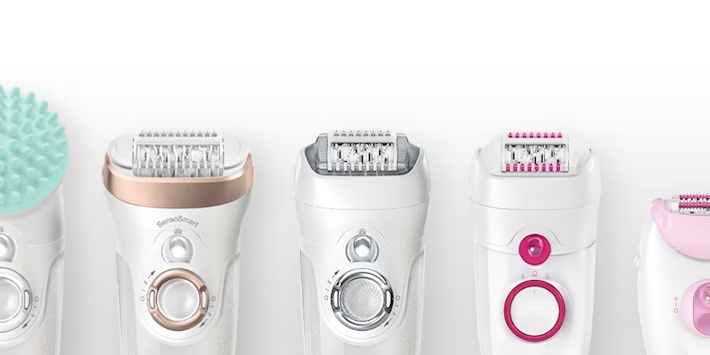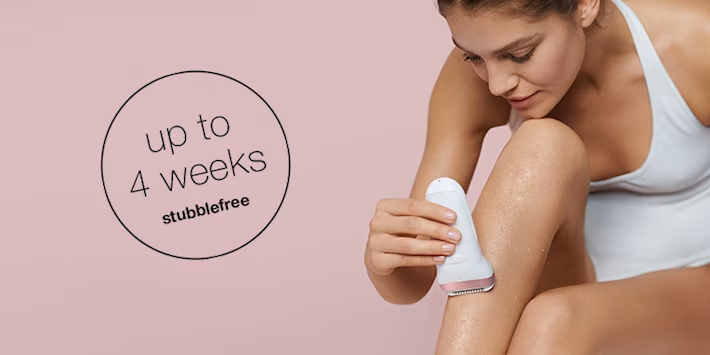Root hair removal methods
With these methods you remove your body hair by the root. It takes weeks for hair to grow back, and when it does, it is usually softer and thinner than before. The great thing is that root hair removal lets you enjoy smooth skin for a very long time – up to 4 weeks.
Epilating
Works by:
Using a hand-held device that has a head of rotating tweezers which you run along the skin’s surface, removing hairs as it goes.
Best for:
All body parts - legs, underarms, arms, bikini area and face
Advantages:
Ultra-smooth results, lasting up to four weeks. It is mess free and new models also come with an extra attachment for removing unwanted hair from specific areas such as the face.
Disadvantages:
It may be uncomfortable in more sensitive areas.
Beauty rating:
Epilators can remove hairs as short as 0.5mm, unlike wax which needs lengths of 2mm hair growth for optimal results – so there’s no need to wait for unsightly regrowth.
Dermatologist’s note:
“Because with epilation the hair is removed at the root, when it does grow back the tip tends to be tapered which results in it having a finer appearance. In addition, regular epilation can reduce the number of in-growing hairs.”
Waxing
Works by:
Applying hot or cold wax to the skin in the direction of hair growth. Then, once it solidifies, fabric strips are smoothed on and quickly stripped off against the direction of the growth, pulling the hair out with it. An alternative option are pre-made wax strips.
Best for:
Legs, bikini, eyebrows, underarms and upper lip.
Advantages:
Wax can keep skin hair free for weeks, so you don’t have to think about hair removal for some time.
Disadvantages:
Can be painful. Plus you have to wait until hairs are long enough before you can wax them again, which can be a problem if you want to bare your legs or hate the feeling of regrowing hairs. If you do it yourself, it can be messy, and if you go to a salon, it can be expensive. Finally, wax can miss very short hairs.
Beauty rating:
Great if you find daily hair removal a ‘hassle’ – and if you’re prepared to pay for a professional treatment.
Dermatologist’s note:
When you wax, skin can be left dry afterwards. Follow with a soothing lotion, ideally one containing aloe vera.
Threading
Works by:
Taking fine pieces of cotton thread and twining the thread round each individual hair then pulling the thread quickly apart, removing the hair along with it.
Best for:
Small, delicate areas like eyebrows and upper lip.
Advantages:
Hairs are removed from the root, so regrowth is slow, and hairs don’t grow back prickly.
Disadvantages:
Fairly slow process, since hairs need to be pulled out one by one. It’s also quite a specialized procedure, so you need to go to a well-trained professional.
Beauty rating:
Great for eyebrows – once they’ve tried it, most women are converts.
Dermatologist’s note:
“Threading is not very traumatic for the skin, so is good to use on particularly sensitive areas like the upper lip or eyebrow.”
Surface hair removal methods
With these methods you remove the parts of body hair that have grown above the skin surface. Generally it is quite easily done, but on the other hand you need to do it pretty often. Read on to learn about the various root hair removal methods and understand what the differences are.
Electric Shaving
Works by:
Passing a small electric machine with a fine screen at one end across the skin’s surface, trapping hair. Blades move laterally and cut the hairs against the edge of the screen.
Best for:
Legs, bikini area, underarms
Advantages:
Quick, safe and because you do it ‘dry’, it’s easy to do on the go. Also a good option for those with very sensitive skin.
Disadvantages:
The ‘hairless’ effect doesn’t last as quite as long as wet shaving. The razor also needs looking after properly, which means regular cleaning and changing the blade annually.
Beauty rating:
Great as a gentle and quick hair removal method.
Dermatologist’s note:
“This is a convenient hair removal option that’s gentle enough to be suitable for most people. Don’t use it if your skin is already irritated by cuts or rashes, though.”
Wet shaving
Works by:
Gliding blades over moistened skin to cut hair at the surface.
Best for:
Legs, underarms, bikini area
Advantages:
Fast, effective, painless and also gently exfoliates dry, flaky skin on legs to keep them looking extra-smooth.
Disadvantages:
Whilst shaving does reveal beautifully smooth skin you have to keep on doing it frequently in order to maintain the smooth results.
Beauty rating:
A great option for busy women.
Dermatologist’s note:
“Shaving is a convenient option – but it’s important to do it properly. Just using soap and water is not ideal as it often leaves skin with a dry, scaly appearance. It is better to use a moisturizing shave gel.”
Depilatory Creams
Works by:
Chemically dissolving the hair at the surface of the skin. Once applied, the cream is left on the skin for up to 10 minutes then removed by gently rubbing away at the hair.
Best for:
Upper lip, bikini area and underarms
Advantages:
Pain-free, inexpensive.
Disadvantages:
Can sometimes be messy and difficult to apply. Traditionally, products have had an unpleasant smell, though some are better than others. Skin irritation can be a problem, too, so it’s best to do a patch test 24 hours before you want to apply.
Beauty rating:
Best for small areas like face and underarms
Dermatologist’s note:
“If you have sensitive skin, depilatory creams may not be the most appropriate option, because the chemicals contained in them can cause both irritant and allergic reactions. Always carry out a patch test, ideally on the inside of the arm and better still on two separate occasions, before using it on an entire leg or face.”


